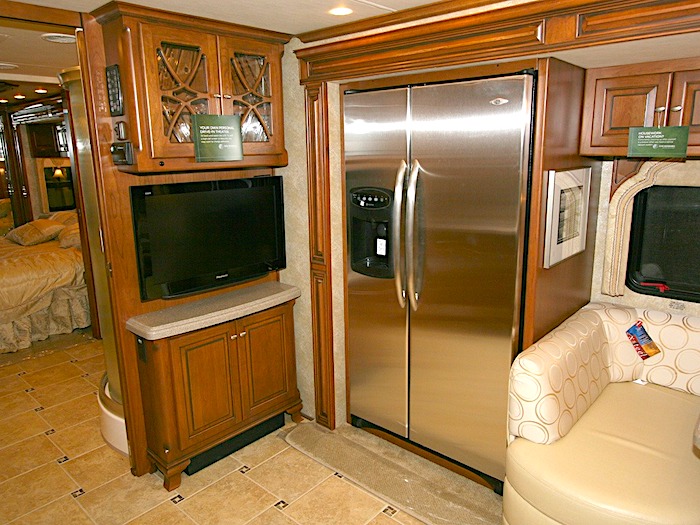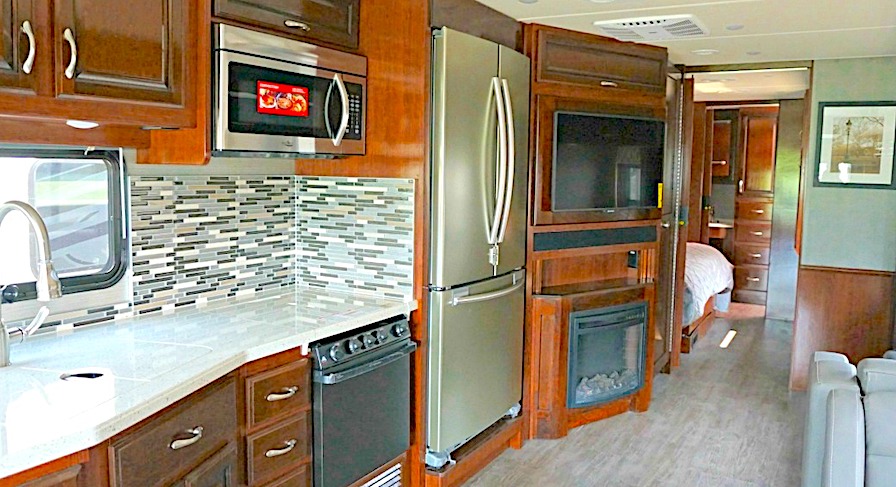Thanks for your support! If you make a purchase using our links in this article, we may make a commission. And, as an Amazon Associate, I earn from qualifying purchases. See the full disclosure here.
Most RVs come with an RV fridge that is specifically built for RVs. As a result, it is slightly different from your typical residential fridge. With that in mind, you might ask the question, Can You Put a Residential Fridge in an RV?
You can put a residential fridge in an RV. But, there are many things to consider such as power, size and the life of the refrigerator.
When you’re living in an RV, one of the most important appliances in your vehicle is the refrigerator.
Having a good RV fridge gives you the ability to stay on the road for longer and pack a larger variety of foods.
Without the fridge to keep things cool, you would be forced to eat nothing but non-perishable foods for the duration of your trip.
Having canned food would get old quick, so having a fridge is essential for anyone who goes on trips in their RV regularly.
What’s the Difference Between an RV Fridge and a Residential Refrigerator?
An RV is essentially a tiny home. Some people use them for trips, but others live in them all year round.
As a result, they’re built so that people can live in them if need be. However, they are obviously much smaller than a regular home, so a lot of the appliances inside are smaller.
This is true for RV fridges. An RV fridge is built to fit in a more compact space. As a result, they are smaller than residential fridges. However, the gap has narrowed in recent years.
Additionally, many RV fridges don’t have the extra features that are present in residential fridges. For example, French doors and ice makers aren’t common in RV fridges. However, as the years have gone on, more and more RV fridges have adopted these features.
Furthermore, how each type of fridge runs is different. RV fridges will use liquid propane or 110 volt to run, whereas a residential refrigerator will use 110 volt exclusively. Additionally, residential fridges use a compressor, and conversely, an RV fridge uses absorption refrigeration along with proper ventilation.
Finally, more maintenance will be required of an RV fridge than a residential fridge. This is because RV fridges are designed with the knowledge that they’ll be moving down a road a lot. As a result, the installation process provides a secure placement, but they’re heavier. So, when you need to do maintenance, it will take a lot more effort.
Can I Replace my RV Refrigerator with a Standard Refrigerator?
If you purchase your RV and you don’t like your RV fridge you can replace it with a standard residential refrigerator. However, you need to consider your options before you make this decision.
There are a lot of factors to consider when replacing your RV refrigerator.
First, you need to factor in the size of the refrigerator. Take measurements to see how much space you have for the new fridge.
RVs obviously have a lot less space than a regular home, so you won’t be able to install the biggest fridge available. The last thing you’d want is to go through the hassle of purchasing a new residential fridge for your RV and then realize that it doesn’t fit. So, make sure you know exactly how much space you have to work with.
When you take measurements, make sure to measure the height as well as the length and width.
The height is a measurement that’s often forgotten because you don’t usually need it. However, RVs have lower ceilings than a normal home, so you need that information as well.
If you decide you want to replace your RV fridge with a residential refrigerator, you have to first remove the old one. It’s a good idea to have help to remove your old RV refrigerator.
Trying to perform this task on your own can be extremely dangerous, particularly the propane hookups.
Also, fridges are heavy! Trying to move one on your own is just asking for something to go wrong. So, wait for a friend or family member to be available before you take on the project.

How Much Power Does a Residential Fridge in an RV Use?
There is no one-size-fits-all answer to this question because refrigerators come in many sizes.
A typical 22 cubic foot refrigerator uses around 1,200 watts to start and 200 watts to run. Residential refrigerators do not run continuously, they shut off when they reach the proper temperature.
When you’re plugged into shore power, a residential refrigerator in your RV can run indefinitely. However, if you’re boondocking or dry camping, it’s very important to understand your power needs.
If you decide to install a residential fridge in your RV, be sure you understand the power requirements and that you have an appropriate way to power your new fridge.
Otherwise, you’ll be dealing with dead batteries and spoiled food. That doesn’t sound fun at all.
Will I Need Bigger Batteries if I Install a Residential Fridge in My RV?
Most RVs come stock with a couple or a few house batteries. These are typically lead-acid deep cycle batteries and while they’re good for a short period, you’ll want to upgrade them if you like to boondock.
If your RV has lead acid batteries, keep in mind that only half of your battery capacity can actually be used. That means if you have two 100 amp hour batteries, you can only actually use around 100 amp hours. If this is the case for you, you will need to upgrade your battery bank to run a residential refrigerator in your RV while off-grid.
If you stick with the batteries that the manufacturer provides, you will need to use the generator in the morning for a few hours and at night for a few hours to keep the batteries from dropping to below 50%.
Not only is this tedious, but it puts a lot of strain on your generator and it can get quite expensive. To avoid this, you should purchase more powerful batteries to power your residential fridge.
How Long Will a Residential Refrigerator Last in an RV?
Refrigerators are meant to have a long life span. As a result, even the models that last the shortest will still last around 10 years unless they break in some unforeseen way. However, you can generally expect a residential refrigerator to last somewhere from 14 to 17 years.
However, your fridge will only last as long as you put in the effort to maintain it. Without proper care and maintenance, you can expect the life expectancy of your residential to drop drastically. This is especially true when it’s in an RV because it’s more at risk of damage while you’re driving.
Simple things you can do to maintain your fridge include keeping it out of direct sunlight and away from appliances that produce a lot of heat. You should also ensure that the coils on the back of the fridge are several inches away from the wall, and you should clean those coils regularly. Additionally, you can clean the door seals regularly to help prevent them from drying out and cracking.
Finally, you should empty and clean your fridge once a month. While you’re doing this you should check the internal temperature. A residential refrigerator should be between 37- and 40-degrees Fahrenheit. If it isn’t in that range, you will need to get it fixed.
Can I Boondock with a Residential Refrigerator?
Many RV owners are interested in boondocking, also known as dry camping. So, can you boondock with a residential fridge in your RV? Luckily, yes. It is possible to boondock with a residential fridge. However, you can only do so if your power system is suitable.
The biggest problem for boondocking almost always comes from energy consumption. Since a residential refrigerator takes more energy to run than a regular RV fridge, this can be an issue. However, if you have a bigger power supply and you go on your trip prepared there’s no reason that you couldn’t go boondocking with a residential fridge. It will require more work and preparation to get everything to work, but it is certainly possible.
Residential Fridge vs RV Fridge
Now that you have a lot of information on residential fridges and RV fridges, it’s time to compare the two. When it comes to power, and an RV fridge can be two or three powered. Conversely, a residential fridge will work with the 110-volt electrical supply. If you are plugged into an electrical supply at a campsite will be better off with the residential fridge. However, if you don’t have access to that electrical supply you might run into power issues with a residential fridge. In this situation, an RV fridge will be more suitable.
When it comes to size, it isn’t really a contest between the two. Residential fridges are larger, have more features, and are more reliable all around. Although RV fridges are closing the gap, residential fridges are better in every way when it comes to size.
Additionally, efficiency can be a problem for RV fridges compared to residential refrigerators. They can take a longer time to cool down food and they sometimes struggle to keep food cold. Residential fridges have no problems in this area.
Furthermore, RV fridges require more maintenance than residential fridges. Failing to do this maintenance can cause harm to its efficiency.
One of the biggest downsides to using a residential refrigerator is that turning them off is a bad idea. Conversely, RV fridges are designed to thrive in these situations. As a result, you may run into power issues with a residential fridge.
As you can see, residential fridges are better in most areas. However, the biggest problem they run into is that they take more power to run. As a result, you need to assess how much energy and power you can put into your fridge. If you don’t have the power to run a residential fridge, switching to one is inadvisable.

Is a Residential Fridge a Good Fit for You?
After reading, we hope you have all the information you need to make an informed decision on whether you should switch to a residential fridge or not. We know that there’s a lot of information to take in but absorbing all that knowledge is important. Otherwise, you could be making a decision you’d regret.
When deciding whether to switch to a residential fridge, make sure you know how much space you have to work with, and how much power you have access to. Without these two pieces of data, you won’t be able to make the switch. If you purchase a residential fridge without that information, you may find that you’ve wasted a lot of money on a fridge that you can’t power or doesn’t fit.
With that in mind, there’s nothing wrong with sticking with your RV fridge or switching to a residential one. The decision is completely up to you. No matter your preference, as long as you do the proper research, you shouldn’t have any issues.
What type of fridge are you using at the moment? Will you be switching to a residential fridge? Did you find the information we provided helpful? Let us know in the comments below!



You haven’t mentioned anything about solar power. Our RV is a houseboat and we plan to run a residential fridge, Starlink and lots of electric kitchen devices with a 350 Watt panel, a 3000 Watt inverter/charger and 6 x 6 volt batteries. Do we need to purchase another panel?
How do you store an RV with a residential fridge? Leave the fridge running or turn it off?
Enjoyed this very much,are there any problems with the residential fridge when traveling down the road in other words, do they handle the road travel ok
And do they lose a warranty if its in an RV?